The LLILAS Benson Digital Scholarship Fellowship program provides stipends of up to $3,000 for students and scholars to undertake remotely research or teaching projects in Latin American, U.S. Latine, African Diaspora, or Indigenous Studies using data, born-digital sources (e.g. websites, social media posts), and/or the Benson Latin American Collection’s digitized holdings AND digital methods/platforms. The call for proposals will open September 2024.
2024 Fellows
 Mauro Aguirre is currently pursuing a Masters of Digital Humanities at the University of Tres de Febrero in Buenos Aires, Argentina. In 2021, he obtained his Bachelor of Social Communication degree, focusing on the concept of the home office as immaterial labor in the context of the COVID pandemic. His interests include human rights, social movements, and resistance practices. For his fellowship, he will be visualizing and examining audiovisual collections preserved at Memoria Abierta (Argentina). These recordings contain testimonies given during the Truth Trials in Argentina, which took place between 1999-2010. This is a joint fellowship with the Initiative for Digital Humanities’ AVAnnotate Project.
Mauro Aguirre is currently pursuing a Masters of Digital Humanities at the University of Tres de Febrero in Buenos Aires, Argentina. In 2021, he obtained his Bachelor of Social Communication degree, focusing on the concept of the home office as immaterial labor in the context of the COVID pandemic. His interests include human rights, social movements, and resistance practices. For his fellowship, he will be visualizing and examining audiovisual collections preserved at Memoria Abierta (Argentina). These recordings contain testimonies given during the Truth Trials in Argentina, which took place between 1999-2010. This is a joint fellowship with the Initiative for Digital Humanities’ AVAnnotate Project.
 Eduardo Gorobets Martins is a PhD student in the Department of Spanish and Portuguese at the University of Texas at Austin and he is interested in colonial Mexico history and culture, Nahuatl language, and digital humanities. He contributed to the project Unlocking the Colonial Archive between 2022-2023, being awarded for the LLILAS-Benson Digital Scholarship Fellowship and working as Graduate Research Assistant at the Digital Scholarship Lab, LLILAS-Benson Collections, at UT-Austin. In this new project, Eduardo will conduct an exploratory investigation about the Christian translations of concepts of the body to Nahuatl in two sermons produced in the 16th and 18th centuries, using the digital tools Transkribus, FromThePage, and Recogito.
Eduardo Gorobets Martins is a PhD student in the Department of Spanish and Portuguese at the University of Texas at Austin and he is interested in colonial Mexico history and culture, Nahuatl language, and digital humanities. He contributed to the project Unlocking the Colonial Archive between 2022-2023, being awarded for the LLILAS-Benson Digital Scholarship Fellowship and working as Graduate Research Assistant at the Digital Scholarship Lab, LLILAS-Benson Collections, at UT-Austin. In this new project, Eduardo will conduct an exploratory investigation about the Christian translations of concepts of the body to Nahuatl in two sermons produced in the 16th and 18th centuries, using the digital tools Transkribus, FromThePage, and Recogito.
 Dr. Francisco Mamani Fuentes holds a Ph.D. in Aesthetics, History, and Arts Theory from the École Normale Supérieure (France) and the University of Granada (Spain). His research focuses on the intersection of builders’ agency, construction techniques, materiality, and the natural environment in the Colonial Andes within Construction History. Currently, he is a fellow at the Thoma Foundation Arts of Spanish Americas Research & Travel Grant. For his fellowship, Francisco will be developing the first digital edition of the Framing Carpentry section of Fray Andrés de San Miguel’s Manuscript (17th century).
Dr. Francisco Mamani Fuentes holds a Ph.D. in Aesthetics, History, and Arts Theory from the École Normale Supérieure (France) and the University of Granada (Spain). His research focuses on the intersection of builders’ agency, construction techniques, materiality, and the natural environment in the Colonial Andes within Construction History. Currently, he is a fellow at the Thoma Foundation Arts of Spanish Americas Research & Travel Grant. For his fellowship, Francisco will be developing the first digital edition of the Framing Carpentry section of Fray Andrés de San Miguel’s Manuscript (17th century).
 Ibis Mery Q. is a doctoral candidate at the Universidad Nacional del Centro de la Provincia de Buenos Aires. Her doctoral thesis focuses on zooarchaeological studies and acts of resistance to slavery through food production and consumption in the context of Black geographies in the northern Andes of Ecuador. For her fellowship, Mery will be making a dataset on the demographic distribution and possible material culture of the different migrations of the populations that were enslaved before arriving at Chota Mira using the Benson’s Colombian Manumission collection. This is a joint fellowship with LLILAS’s Archiving Black América Initiative.
Ibis Mery Q. is a doctoral candidate at the Universidad Nacional del Centro de la Provincia de Buenos Aires. Her doctoral thesis focuses on zooarchaeological studies and acts of resistance to slavery through food production and consumption in the context of Black geographies in the northern Andes of Ecuador. For her fellowship, Mery will be making a dataset on the demographic distribution and possible material culture of the different migrations of the populations that were enslaved before arriving at Chota Mira using the Benson’s Colombian Manumission collection. This is a joint fellowship with LLILAS’s Archiving Black América Initiative.
 Dr. Lilia Raquel Rosas is an Assistant Professor of Instruction in the Department of Mexican American and Latina/o Studies at UT Austin, where her teaching and research interests include relational and comparative Ethnic and Queer Studies through the histories of (me)Xicana/o/s, African Americans, women, indigeneity, and race and sexualities. Dr. Rosas will be developing her project, Tejana Historias: Indigenous Indentations and Transfrontera Transformations, a visual repository that reveals the struggles, resistance and liberation of Tejanas as indigenous, Spanish-Mexicans, (me)Xicanas, Chicanas, Xicanindias, mestizas and Afromexicanas from precontact to decolonization. This is a joint fellowship with the Initiative for Digital Humanities’ AVAnnotate Project.
Dr. Lilia Raquel Rosas is an Assistant Professor of Instruction in the Department of Mexican American and Latina/o Studies at UT Austin, where her teaching and research interests include relational and comparative Ethnic and Queer Studies through the histories of (me)Xicana/o/s, African Americans, women, indigeneity, and race and sexualities. Dr. Rosas will be developing her project, Tejana Historias: Indigenous Indentations and Transfrontera Transformations, a visual repository that reveals the struggles, resistance and liberation of Tejanas as indigenous, Spanish-Mexicans, (me)Xicanas, Chicanas, Xicanindias, mestizas and Afromexicanas from precontact to decolonization. This is a joint fellowship with the Initiative for Digital Humanities’ AVAnnotate Project.
 Ipek Sahinler is a PhD candidate in Comparative Literature at UT Austin, where she teaches rhetoric and writing alongside Turkish. Her dissertation is about the Queer Global South, with a particular focus on modern Turkish and Mexican literature. For her fellowship, Ipek will work with the Gloria Evangelina Anzaldúa Papers, focusing on the Chicana writer’s overlooked editorial manuscripts. She will draw a schema of “Anzaldúan proto-queer rhetoric” in the light of the author’s proofread essay drafts, working notes, letters, and editorial correspondences. Inspired by the methods employed by recent academic works on Anzaldúa and “third world” queer thinking, Ipek’s project will elucidate how Anzaldúa, in the early 1990s, attempted to conceptualize a “queer sensitivity” that included yet was not limited to gender and sexuality.
Ipek Sahinler is a PhD candidate in Comparative Literature at UT Austin, where she teaches rhetoric and writing alongside Turkish. Her dissertation is about the Queer Global South, with a particular focus on modern Turkish and Mexican literature. For her fellowship, Ipek will work with the Gloria Evangelina Anzaldúa Papers, focusing on the Chicana writer’s overlooked editorial manuscripts. She will draw a schema of “Anzaldúan proto-queer rhetoric” in the light of the author’s proofread essay drafts, working notes, letters, and editorial correspondences. Inspired by the methods employed by recent academic works on Anzaldúa and “third world” queer thinking, Ipek’s project will elucidate how Anzaldúa, in the early 1990s, attempted to conceptualize a “queer sensitivity” that included yet was not limited to gender and sexuality.
 Dr. Jessica L. Sánchez Flores is a Nahua-descent scholar from Guerrero, México. She is currently an Assistant Professor in the Department of Spanish and Portuguese at Colorado College. Her research centers primarily on the cultural production by Indigenous artists and creators from México and the diaspora. Pilar and Jessica, as part of their fellowship, will build on their 2019 dataset from the #LasdeAbiayala social media initiative, focusing on cleaning and standardizing the data to advance toward the project’s next stage—the creation of a story map using ArcGIS for data visualization. This is a joint fellowship with LLILAS’s Archiving Black América Initiative.
Dr. Jessica L. Sánchez Flores is a Nahua-descent scholar from Guerrero, México. She is currently an Assistant Professor in the Department of Spanish and Portuguese at Colorado College. Her research centers primarily on the cultural production by Indigenous artists and creators from México and the diaspora. Pilar and Jessica, as part of their fellowship, will build on their 2019 dataset from the #LasdeAbiayala social media initiative, focusing on cleaning and standardizing the data to advance toward the project’s next stage—the creation of a story map using ArcGIS for data visualization. This is a joint fellowship with LLILAS’s Archiving Black América Initiative.
 Pilar Villanueva-Martinez is a first-generation college student and scholar from Santiago, Chile. She is currently a doctoral candidate in the Department of Spanish and Portuguese at UT Austin and the Co-founder and Editor of the Latin American magazine Revista Zánganos. Her research centers on urban cultural productions by Indigenous, Black, and Mestiza women in Mexico, Colombia, and Chile. Pilar and Jessica, as part of their fellowship, will build on their 2019 dataset from the #LasdeAbiayala social media initiative, focusing on cleaning and standardizing the data to advance toward the project’s next stage—the creation of a story map using ArcGIS for data visualization. This is a joint fellowship with LLILAS’s Archiving Black América Initiative.
Pilar Villanueva-Martinez is a first-generation college student and scholar from Santiago, Chile. She is currently a doctoral candidate in the Department of Spanish and Portuguese at UT Austin and the Co-founder and Editor of the Latin American magazine Revista Zánganos. Her research centers on urban cultural productions by Indigenous, Black, and Mestiza women in Mexico, Colombia, and Chile. Pilar and Jessica, as part of their fellowship, will build on their 2019 dataset from the #LasdeAbiayala social media initiative, focusing on cleaning and standardizing the data to advance toward the project’s next stage—the creation of a story map using ArcGIS for data visualization. This is a joint fellowship with LLILAS’s Archiving Black América Initiative.
2023 Fellows
 Vera Estrada Burrows is a Ph.D. Candidate in the Department of Spanish and Portuguese at the University of Texas at Austin. Her field of study is dictatorial power and the language of violence and genocide. Her dissertation topic focuses on the language of military dictator General Efraín Ríos Montt during his dictatorship of 1982-1983. For her fellowship, Vera will use AudiAnnotate and Audacity software to annotate twelve audio files from Radio Venceremos, an underground radio broadcast by the Frente Farabundo Martí para la Liberación Nacional (FMLN) during El Salvador’s civil war, which is a collection from the Human Right Documentation Initiative (HRDI) at the University of Texas at Austin.
Vera Estrada Burrows is a Ph.D. Candidate in the Department of Spanish and Portuguese at the University of Texas at Austin. Her field of study is dictatorial power and the language of violence and genocide. Her dissertation topic focuses on the language of military dictator General Efraín Ríos Montt during his dictatorship of 1982-1983. For her fellowship, Vera will use AudiAnnotate and Audacity software to annotate twelve audio files from Radio Venceremos, an underground radio broadcast by the Frente Farabundo Martí para la Liberación Nacional (FMLN) during El Salvador’s civil war, which is a collection from the Human Right Documentation Initiative (HRDI) at the University of Texas at Austin.

Víctor Garre León is a Ph.D. candidate in the Department of Spanish and Portuguese at the University of Texas at Austin. He specializes in the areas of second language acquisition, discourse studies, and Spanish pragmatics. He is currently writing his dissertation on the development of interactional competence in Spanish as a second language. For his fellowship, he will analyze the intellectual production of political illustrators in penny press publications at the end of the Porfiriato. By focusing on an analysis of humor and irony in visual-verbal discourse in Spanish from a pragmatic perspective and a qualitative grounded approach, he will create a dataset of common emerging themes from across a corpus of the LLILAS Benson’s Prensa Obrera Collection.
 Ethen S. Peña has an M.A. in History from Texas State University. He currently holds a visiting assistant professorship of history at Huston-Tillotson University. His work explores the relationship between labor, belonging and identity in the U.S.-Mexico Borderlands. For his fellowship, Ethen will be mapping out the relationships formed by Gloria Anzaldúa and myriad radical feminists of color through the process of creating the seminal edited anthologies This Bridge Called My Back, Haciendo Caras, and This Bridge We Call Home. By mapping out how and when these relationships formed, we can visualize feminist modes of relationship as/in process. This is a joint fellowship with LLILAS’s Archiving Black América Initiative.
Ethen S. Peña has an M.A. in History from Texas State University. He currently holds a visiting assistant professorship of history at Huston-Tillotson University. His work explores the relationship between labor, belonging and identity in the U.S.-Mexico Borderlands. For his fellowship, Ethen will be mapping out the relationships formed by Gloria Anzaldúa and myriad radical feminists of color through the process of creating the seminal edited anthologies This Bridge Called My Back, Haciendo Caras, and This Bridge We Call Home. By mapping out how and when these relationships formed, we can visualize feminist modes of relationship as/in process. This is a joint fellowship with LLILAS’s Archiving Black América Initiative.
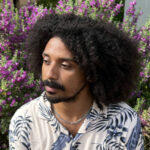 Isaiah Frost Rivera (He/They) is a Staten Island born and raised scholar, maker, and blackqueer digital speculator pursuing his PhD in the African and African Diaspora Studies program at UT Austin. They hold a BA from CUNY Brooklyn College in English with a double minor in LGBTQ Studies and Puerto Rican & Latino Studies, along with an MA in Regional Studies (Latin America & the Caribbean) from Columbia University, and an MA in English from Lehigh University. His research interests include queer Afro-Latinx/Caribbean political formations, alternative archives in the digital age, and the intersections between metamodern horror and retributive justice. For his fellowship, they will locate and close-read multimodal artifacts dispersed across the Benson’s digital resources to assemble an archival lineage of black diasporic fugitivity and freedom that may also function as a public-facing educational resource for digital humanities scholars exploring the pedagogical uses of online search tools. This is a joint fellowship with LLILAS’s Archiving Black América Initiative.
Isaiah Frost Rivera (He/They) is a Staten Island born and raised scholar, maker, and blackqueer digital speculator pursuing his PhD in the African and African Diaspora Studies program at UT Austin. They hold a BA from CUNY Brooklyn College in English with a double minor in LGBTQ Studies and Puerto Rican & Latino Studies, along with an MA in Regional Studies (Latin America & the Caribbean) from Columbia University, and an MA in English from Lehigh University. His research interests include queer Afro-Latinx/Caribbean political formations, alternative archives in the digital age, and the intersections between metamodern horror and retributive justice. For his fellowship, they will locate and close-read multimodal artifacts dispersed across the Benson’s digital resources to assemble an archival lineage of black diasporic fugitivity and freedom that may also function as a public-facing educational resource for digital humanities scholars exploring the pedagogical uses of online search tools. This is a joint fellowship with LLILAS’s Archiving Black América Initiative.
 André K. Rodarte is a second-year PhD student in the School of Journalism and Media at UT. He holds an MPhil in the Sociology of Media and Culture (St. Edmund’s College, University of Cambridge) and an undergraduate degree in Social Communication (ESPM, Brazil). He is a graduate research fellow of the Propaganda Research Team at the Center of Media Engagement. His research explores the role of social media in representative politics, with an empirical focus on Brazil.
André K. Rodarte is a second-year PhD student in the School of Journalism and Media at UT. He holds an MPhil in the Sociology of Media and Culture (St. Edmund’s College, University of Cambridge) and an undergraduate degree in Social Communication (ESPM, Brazil). He is a graduate research fellow of the Propaganda Research Team at the Center of Media Engagement. His research explores the role of social media in representative politics, with an empirical focus on Brazil.
 Adriana Rodríguez Alfonso has recently received her PhD from the Department of Spanish and Hispanic American Literature at the University of Salamanca. Her work focuses on the intersection of Latin American literature, social theory, and Global South studies. Her research seeks to shed light on cultural and material networks, emphasizing not only how texts and actors are able to cross national borders taking part in a global exchange, but also how they can break schemes within power relations. For her fellowship, Adriana will create a dataset on Cuban-Germanies intellectual relations during the Cold War from the Fidel Castro’s speeches collections, and she will provide data visualizations of the main themes underscored as well as the semantic networks those ideas mobilized, in order to unveil the political and cultural imaginaries about both Germanies in the Caribbean island.
Adriana Rodríguez Alfonso has recently received her PhD from the Department of Spanish and Hispanic American Literature at the University of Salamanca. Her work focuses on the intersection of Latin American literature, social theory, and Global South studies. Her research seeks to shed light on cultural and material networks, emphasizing not only how texts and actors are able to cross national borders taking part in a global exchange, but also how they can break schemes within power relations. For her fellowship, Adriana will create a dataset on Cuban-Germanies intellectual relations during the Cold War from the Fidel Castro’s speeches collections, and she will provide data visualizations of the main themes underscored as well as the semantic networks those ideas mobilized, in order to unveil the political and cultural imaginaries about both Germanies in the Caribbean island.
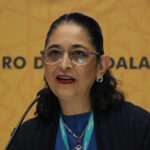 Mercedes I. Salomón Salazar has a B.A. in Humanities and M.A. in Information Design from the Universidad de las Américas, Puebla (both summa cum laude). She has worked at the Biblioteca Histórica José María Lafragua (Benemérita Universidad Autónoma de Puebla) since September 2005, holding the positions of Head of Conservation, Project Coordinator and currently she is the actual director. She will be documenting firebrands in the Benson’s Rare Book collection to include them in the Catálogo Colectivo de Marcas de Fuego.
Mercedes I. Salomón Salazar has a B.A. in Humanities and M.A. in Information Design from the Universidad de las Américas, Puebla (both summa cum laude). She has worked at the Biblioteca Histórica José María Lafragua (Benemérita Universidad Autónoma de Puebla) since September 2005, holding the positions of Head of Conservation, Project Coordinator and currently she is the actual director. She will be documenting firebrands in the Benson’s Rare Book collection to include them in the Catálogo Colectivo de Marcas de Fuego.
2022 Fellows
 Ricardo Framil Filho is a Ph.D. candidate in Sociology at the University of São Paulo, Brazil. His research explores the relationships between industrial production, social conflict, and contestation embedded in global production networks. During his Mellon-funded fellowship, he will use digital tools to process and analyze documents from the Equipe de Articulação e Assessorias às Comunidades Negras do Vale do Ribeira (EAACONE), focusing on the struggles of quilombola communities in the context of socio-environmental conflicts related to hydropower dams in Brazil.
Ricardo Framil Filho is a Ph.D. candidate in Sociology at the University of São Paulo, Brazil. His research explores the relationships between industrial production, social conflict, and contestation embedded in global production networks. During his Mellon-funded fellowship, he will use digital tools to process and analyze documents from the Equipe de Articulação e Assessorias às Comunidades Negras do Vale do Ribeira (EAACONE), focusing on the struggles of quilombola communities in the context of socio-environmental conflicts related to hydropower dams in Brazil.

Eduardo H. Gorobets Martins is a Ph.D. student in the Department of Spanish and Portuguese at the University of Texas at Austin. He received his M.A. in History from the University of São Paulo, Brasil (USP). He is also a researcher of the Center for Mesoamerican and Andean Studies (CEMA) and of the Research Group about Indigenous Work in the Americas (LABORINDIO), both based at the USP. His primary interest is colonial Mexico history, with a focus on Indigenous documents and labor issues. For his fellowship, Eduardo will transcribe, translate, and analyze three documents written in Nahuatl from the Fondo Real de Cholula using digital humanities tools to research the conceptions of justice, land, and labor among the Nahuas during the end of the 17th century.
 Diana Heredia-López is a Ph.D. candidate in the Department of History at the University of Texas at Austin. She holds a B.Sc. in Biology from the National Autonomous University of Mexico (UNAM) where she began her research on the study of nature and its representations in Latin America. Her doctoral project focuses on dye commerce and cultivation in the early modern Atlantic world. For her fellowship, she will mine text and build datasets from the Relaciones Geográficas de México and Guatemala collection to understand early Spanish colonial projects of cultivation and transplantation of commercially valuable species.
Diana Heredia-López is a Ph.D. candidate in the Department of History at the University of Texas at Austin. She holds a B.Sc. in Biology from the National Autonomous University of Mexico (UNAM) where she began her research on the study of nature and its representations in Latin America. Her doctoral project focuses on dye commerce and cultivation in the early modern Atlantic world. For her fellowship, she will mine text and build datasets from the Relaciones Geográficas de México and Guatemala collection to understand early Spanish colonial projects of cultivation and transplantation of commercially valuable species.
 Diego Javier Luis holds a visiting assistant professorship in the Humanities Program at Davidson College. He is finishing a manuscript under contract with Harvard University Press entitled The First Asians in the Americas: A Transpacific History. His articles have appeared recently in Ethnohistory and The Americas. He will use Inquisition cases pertaining to Afro-Mexican lives at the Benson to create web-based simulations of their content with a lesson plan to make them accessible and, to a degree, interactive in a wide variety of pedagogical settings.
Diego Javier Luis holds a visiting assistant professorship in the Humanities Program at Davidson College. He is finishing a manuscript under contract with Harvard University Press entitled The First Asians in the Americas: A Transpacific History. His articles have appeared recently in Ethnohistory and The Americas. He will use Inquisition cases pertaining to Afro-Mexican lives at the Benson to create web-based simulations of their content with a lesson plan to make them accessible and, to a degree, interactive in a wide variety of pedagogical settings.
 Eduardo Bello is a Ph.D. student in the Department of Spanish and Portuguese at Northwestern University. His research interests focus on the manifestations of modernist aesthetics in Latin America from the late nineteenth through the mid-twentieth century and their impact and influence on different disciplines, such as literature, cinema, visual arts, and architecture. For his project, he will develop a digital critical thematic index of the digitized volumes of Violetas del Anáhuac, which will allow readers to readily locate the texts that address the subject of their interest.
Eduardo Bello is a Ph.D. student in the Department of Spanish and Portuguese at Northwestern University. His research interests focus on the manifestations of modernist aesthetics in Latin America from the late nineteenth through the mid-twentieth century and their impact and influence on different disciplines, such as literature, cinema, visual arts, and architecture. For his project, he will develop a digital critical thematic index of the digitized volumes of Violetas del Anáhuac, which will allow readers to readily locate the texts that address the subject of their interest.
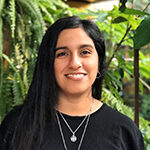 Carolina Rodriguez Alzza is a Ph.D. student in the Linguistic Anthropology area in the Department of Anthropology at the University of Texas at Austin. Her interdisciplinary background comes from an M.A. in Anthropology and a B.A. in Linguistics at the Pontifical Catholic University of Peru. Her research takes place in the Peruvian Amazon and focuses on the role of the language in the conformation of Iskonawa society in the context of historical interethnic relations with other indigenous groups. This fellowship will allow the review of the Iskonawa Language Collection in the Archive of the Indigenous Languages of Latin America (AILLA) through a community-based approach to facilitate access, navigation, and use of the collection for its community of speakers.
Carolina Rodriguez Alzza is a Ph.D. student in the Linguistic Anthropology area in the Department of Anthropology at the University of Texas at Austin. Her interdisciplinary background comes from an M.A. in Anthropology and a B.A. in Linguistics at the Pontifical Catholic University of Peru. Her research takes place in the Peruvian Amazon and focuses on the role of the language in the conformation of Iskonawa society in the context of historical interethnic relations with other indigenous groups. This fellowship will allow the review of the Iskonawa Language Collection in the Archive of the Indigenous Languages of Latin America (AILLA) through a community-based approach to facilitate access, navigation, and use of the collection for its community of speakers.
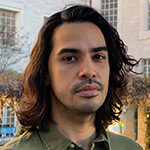 Diego de Jesus Santos is a Ph.D. student in the Department of Spanish & Portuguese at the University of Texas at Austin. He is a filmmaker and researcher from Bahia, Brazil, who has worked as a media activist in maroon-descended communities in the Recônvavo da Bahia, as well as in Maré, one of the largest favela communities in Rio de Janeiro. For his Mellon-funded fellowship, he will be studying environmental racism in the context of the struggle of residents from quilombos of the Vale do Ribeira region against the construction of the Tijuco Alto hydroelectric plant in their territory.
Diego de Jesus Santos is a Ph.D. student in the Department of Spanish & Portuguese at the University of Texas at Austin. He is a filmmaker and researcher from Bahia, Brazil, who has worked as a media activist in maroon-descended communities in the Recônvavo da Bahia, as well as in Maré, one of the largest favela communities in Rio de Janeiro. For his Mellon-funded fellowship, he will be studying environmental racism in the context of the struggle of residents from quilombos of the Vale do Ribeira region against the construction of the Tijuco Alto hydroelectric plant in their territory.
 Tadeo Valverde-Molina is a Ph.D. student of the Literary Tradition, Written Culture and Digital Humanities program at the University of Salamanca, from which he also received an M.A. in 2020. His dissertation, titled “A Study and Critical Edition of the Peruvian Viceregal Short Dramatic Works from the Sixteenth to Eighteenth Centuries”, focuses on editing and analyzing overlooked and disperse Peruvian short dramatic works (prologues, comical interludes, dances) that can be found in manuscripts and print editions. For his fellowship, Tadeo will catalogue, transcribe, and critically index thirty-five dramatic texts that have been preserved in manuscript form as part of the Genaro García Manuscripts Collection, a heterogenous corpus of “Comedias manuscritas”.
Tadeo Valverde-Molina is a Ph.D. student of the Literary Tradition, Written Culture and Digital Humanities program at the University of Salamanca, from which he also received an M.A. in 2020. His dissertation, titled “A Study and Critical Edition of the Peruvian Viceregal Short Dramatic Works from the Sixteenth to Eighteenth Centuries”, focuses on editing and analyzing overlooked and disperse Peruvian short dramatic works (prologues, comical interludes, dances) that can be found in manuscripts and print editions. For his fellowship, Tadeo will catalogue, transcribe, and critically index thirty-five dramatic texts that have been preserved in manuscript form as part of the Genaro García Manuscripts Collection, a heterogenous corpus of “Comedias manuscritas”.
2021 Fellows
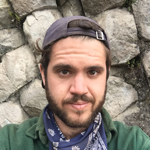 Ryan Scott Hechler is an Anthropology PhD student at Tulane University and he received an Anthropology M.A. from McGill University. His doctoral research focuses on the development of late Pre-Columbian Barbacoan identity and complexity in northern Ecuador and regional transitional colonial experiences under the Inkas and Spanish via archaeology, GIS, and ethnohistory. His principal archaeological site of investigation is the monumental site of Cochasquí in the northern highlands of Ecuador, for which he is a recent recipient of the Fulbright-Hays Doctoral Dissertation Research Abroad Fellowship to support his forthcoming fieldwork. His fellowship project focuses on developing a publicly accessible Geographic Information System (GIS) dataset that accurately maps natural landscape toponyms of Ecuador via the georeferencing of topographic maps in the Perry-Castañeda Library’s Map Collection.
Ryan Scott Hechler is an Anthropology PhD student at Tulane University and he received an Anthropology M.A. from McGill University. His doctoral research focuses on the development of late Pre-Columbian Barbacoan identity and complexity in northern Ecuador and regional transitional colonial experiences under the Inkas and Spanish via archaeology, GIS, and ethnohistory. His principal archaeological site of investigation is the monumental site of Cochasquí in the northern highlands of Ecuador, for which he is a recent recipient of the Fulbright-Hays Doctoral Dissertation Research Abroad Fellowship to support his forthcoming fieldwork. His fellowship project focuses on developing a publicly accessible Geographic Information System (GIS) dataset that accurately maps natural landscape toponyms of Ecuador via the georeferencing of topographic maps in the Perry-Castañeda Library’s Map Collection.
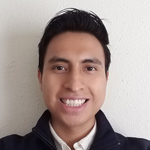 Abisai Perez is a Ph. D. candidate in the Department of History at UT Austin. His dissertation explores how the Spanish crown integrated the Philippine natives as vassals during the sixteenth and seventeenth centuries. His fields of expertise span colonial Latin America, nineteenth-century Mexico, and the Iberian empires in early modern Southeast Asia. He is also interested in Statistics and the programming language Python for research in Data Science. For his fellowship, he will transform a collection of royal decrees in the Genaro Garcia Collection on the colonial government of the Philippines into a data set that he can mine and visualize.
Abisai Perez is a Ph. D. candidate in the Department of History at UT Austin. His dissertation explores how the Spanish crown integrated the Philippine natives as vassals during the sixteenth and seventeenth centuries. His fields of expertise span colonial Latin America, nineteenth-century Mexico, and the Iberian empires in early modern Southeast Asia. He is also interested in Statistics and the programming language Python for research in Data Science. For his fellowship, he will transform a collection of royal decrees in the Genaro Garcia Collection on the colonial government of the Philippines into a data set that he can mine and visualize.
 Marina del Sol received a Ph.D. from the Américo Paredes Center for Cultural Studies at The University of Texas at Austin and a B.A. from the University of California at Berkeley. Currently, she is a Master Instructor at Howard University. Her interdisciplinary scholarship looks at identity and belonging in the United States with a focus on cultural forms and representations of Otherness. Through the mining of the Onda Latina digital archive, her project will identify and illuminate connections between the political sphere and Mexican American culture, folklore, and history as well as examine experiences of citizenship within networks of Mexican American artists, activists, and community members using various infographic tools.
Marina del Sol received a Ph.D. from the Américo Paredes Center for Cultural Studies at The University of Texas at Austin and a B.A. from the University of California at Berkeley. Currently, she is a Master Instructor at Howard University. Her interdisciplinary scholarship looks at identity and belonging in the United States with a focus on cultural forms and representations of Otherness. Through the mining of the Onda Latina digital archive, her project will identify and illuminate connections between the political sphere and Mexican American culture, folklore, and history as well as examine experiences of citizenship within networks of Mexican American artists, activists, and community members using various infographic tools.
2020 Fellows
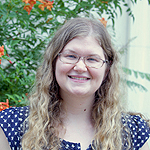
Brittany Erwin is a PhD candidate in the History Department at the University of Texas at Austin. Her dissertation explores the underlying mechanisms that sustained the Spanish Empire during its final decades, arguing that political ritual–public, formulaic expressions of loyalty and obligation–played an essential role in that process. Her project will employ various digital tools to analyze the rhetoric of reciprocity between Crown and subject in 18th-century documents preserved at the Benson.
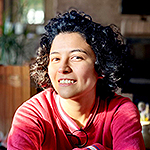 Nidia Hernández is a member of the Argentine Center for Scientific and Technological Information (CAICyT-CONICET) where she collaborates with the documentation, automatic processing and analysis of endangered languages of South America and develops digital resources for georeferencing and pusblishing Early Modern Latin American texts. During her residency at the Benson, she will be developing the first digital edition of Primer viaje alrededor del mundo (1899), a chronicle about the first European circumnavigation of the world and one of the first written texts referring to the Patagonia.
Nidia Hernández is a member of the Argentine Center for Scientific and Technological Information (CAICyT-CONICET) where she collaborates with the documentation, automatic processing and analysis of endangered languages of South America and develops digital resources for georeferencing and pusblishing Early Modern Latin American texts. During her residency at the Benson, she will be developing the first digital edition of Primer viaje alrededor del mundo (1899), a chronicle about the first European circumnavigation of the world and one of the first written texts referring to the Patagonia.
2019 Fellows

Andrea Alvarez holds a Bachelor of Architecture degree from Universidad Central de Venezuela. In June 2018, she received the distinction Summa Cum Laude. Alvarez is currently pursuing a Masters of Architecture Degree at The University of Texas at Austin School of Architecture. At the Benson, she will be studying drawings and descriptions related to “carpinteria de lo blanco” found in the 17th-century manuscript of Fray Andrés de San Miguel to create 3D models to examine the design and building process.
 Antonio Villarruel was born in Quito, Ecuador, and currently lives between Mexico City and Madrid. He is a doctoral candidate both at el Colegio de México and Universidad Autónoma de Madrid. His interests include intellectual history, critical theory, Adean cultures and literatures, and documentary theory. In 2011 he published the essay book “Ciudad y derrota”. He also directed the documentary “Versiones de la vecindad”, on Mexican writer Carlos Monsiváis. For his fellowship, he will be extracting data from the correspondence in the Ernesto Cardenal Papers to visualize and examine his social networks.
Antonio Villarruel was born in Quito, Ecuador, and currently lives between Mexico City and Madrid. He is a doctoral candidate both at el Colegio de México and Universidad Autónoma de Madrid. His interests include intellectual history, critical theory, Adean cultures and literatures, and documentary theory. In 2011 he published the essay book “Ciudad y derrota”. He also directed the documentary “Versiones de la vecindad”, on Mexican writer Carlos Monsiváis. For his fellowship, he will be extracting data from the correspondence in the Ernesto Cardenal Papers to visualize and examine his social networks.